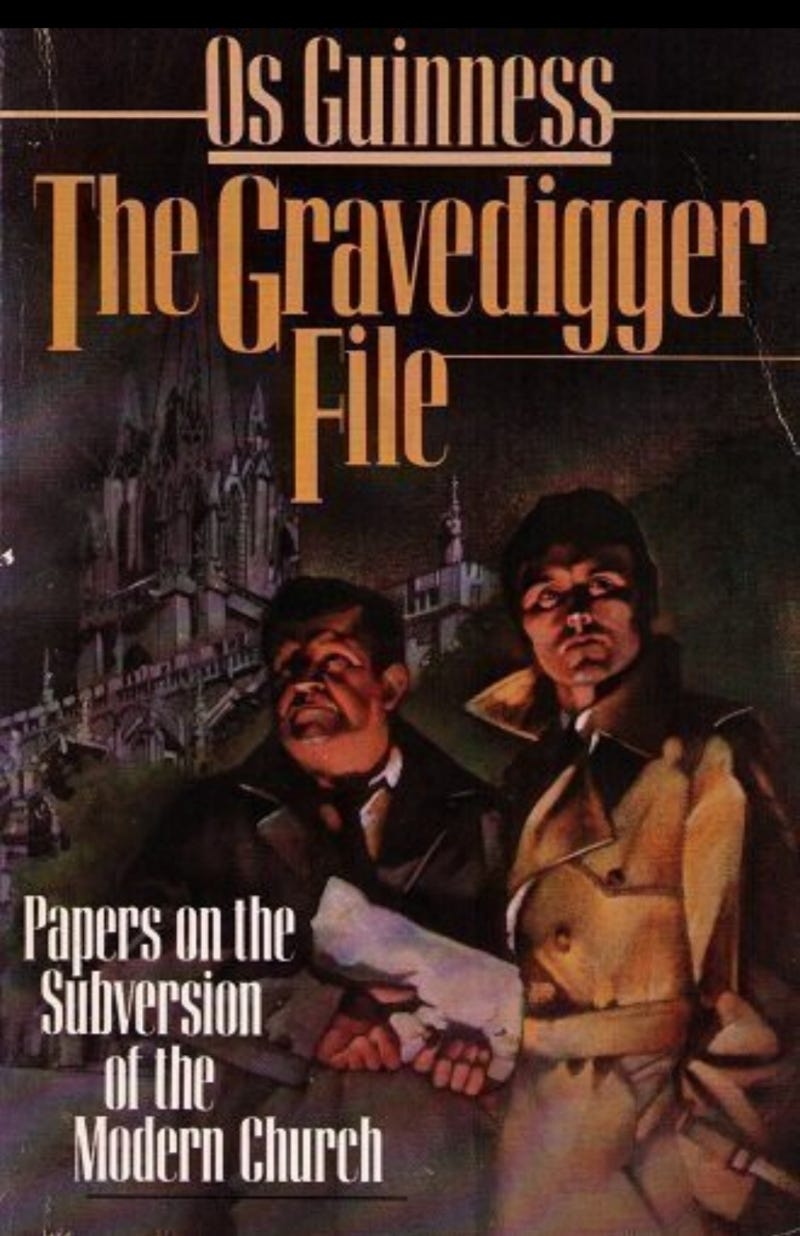How to Recognize and Resist the Devil’s Schemes to Undermine the Church in the Modern World
25 Insights and lessons from Os Guinness's The Gravedigger File: Papers on the Subversion of the Modern Church

The Gravedigger File: Letters on the Subversion of the Modern Church by Os Guinness follows the style of C. S. Lewis’ The Screwtape Letters.
In this deeply apologetic Christian book, the author used satire to expose top-secret correspondences between actively “on the field devils” and their headquarters office, The Directorate.
Written in 1983, Dr. Os Guinness presents many of the philosophies and ideas being employed to subvert the modern Church by its adversaries.
In The Screwtape Letters, the devil’s primary goal is to pervert and ensure the individual Christian derails from his calling and heavenward quest. In The Gravedigger File, the devil’s (and his agents’) aim is to contaminate and weaken the Church in America (and ultimately the entire Church).
In The Screwtape Letters, the devil targets a single Christian at a time, while in The Gravedigger File, he and his agents subvert the Church by working directly from within it.
The author dwelt extensively on the challenges and hindrances confronting the Church in our times. These include secularization, privatization, and pluralization which are being used to create a world that completely dispenses with the Christian worldview.
While doing a great job of intimating the reader on the “behind-the-scenes” exchanges, it ironically seems to give the impression that the Church has been cornered into a no-escape and permanently irrelevant position. Not so.
However, in the final section, the author gave an encouraging challenge for Christians and the Church to return to the faith and ground their feet on the unchanging truth of God’s word.
Written 40 years ago, many of Dr. Guinness’s prophecies and predictions have and are still coming true in our time. The illustrations in the book are interestingly poignant.
The lessons provide insights and blueprints for Christians keen on interacting with the world without becoming one with it.
Favourite Quotes and Insights
Most of these insights are satirical from the antagonist’s point of view. Thus, you are led into an understanding of the thinking and inner workings of the Christian’s archenemy and his agents.
Most Christians, as a current jibe runs, would rather die than think
Even though Christianity contributed to the rise of the modern world; the modern world, in turn, has undermined Christianity; Christianity has become its own gravedigger.
The more the church becomes one with the modern world, the more it becomes compromised, and the deeper the grave it digs for itself.
The devil’s 10-80-10 Strategy: The game plan is to win over 10% of the church to be a counter-elite on his side, reduce 80% of the church to a state of passive acceptance (either cowed or complacent), while disregarding the active resistance of the remaining 10% of the church who are ignorant of the devil’s devices.
Lessons from Samson’s Fall: A person’s or group’s strong point often becomes an unguarded point. Also, a person’s true strengths are not only likely to be left exposed; they can easily be turned inside out and made into real weaknesses.
Samson could become prodigal only because his strength was prodigious. When his gifts became his master, they were the key to his undoing.
The devil’s long term aim is to work out the best way to turn the church’s strengths into weaknesses and turn their enormous advantage into a disadvantage.
“For instance, if their desire to witness leads to cultural involvement, cultural involvement leads in turn to the danger of worldliness. The price of contact would be contamination.”
Lessons from Samson’s Fall: A person’s or group’s strong point often becomes an unguarded point. Also, a person’s true strengths are not only likely to be left exposed; they can easily be turned inside out and made into real weaknesses.
Samson could become prodigal only because his strength was prodigious. When his gifts became his master, they were the key to his undoing.
The devil’s long-term aim is to work out the best way to turn the church’s strengths into weaknesses and turn their enormous advantage into a disadvantage.
For instance, if their desire to witness leads to cultural involvement, cultural involvement leads in turn to the danger of worldliness. The price of contact would be contamination.
Do you know what you believe or you’re just following the multitude? Most Christians have no trouble seeing themselves as “believers.” They may be vague about what they believe and vaguer still about why they believe, but they believe.
Irony apart, the church’s preoccupation with credibility and neglect of plausibility is typical of her weakness. Without a feel for the social dimension of believing, the church is like a person paralyzed from the neck down — quite insensible to the further damage being inflicted on her.
Christians are always more culturally short-sighted than they realize. How? They are often unable to tell, for instance, where their Christian principles leave off and cultural perspectives begin. One area in which this has been heavily manifest is in the confusion of Christian principles and conservative politics - a great self-undoing.
Horrified by “cheap grace,” many Christians are backing happily into its opposite — cheap judgment. Subtle compromise is always better than sudden captivity.
The same historic words are said and sung, but what is shown tells a different story. The indicators of faith are still up (buoyant numbers, increased giving, high spiritual interest, and so on), but contrary to the popular impression, the impact of faith on moral, social, and political life is diminishing, as we all see.
The same historic words are said and sung, but what is shown tells a different story. The indicators of faith are still up (buoyant numbers, increased giving, high spiritual interest, and so on), but contrary to the popular impression, the impact of faith on moral, social , and political life is diminishing, as we all see.
Bad religion is far more damaging to true faith than no religion.
An exclusively domesticated faith is an ineffective and irelevant faith. Secularization seeks, not so much as to remove Christianity altogether, but to reduce its influence in areas essential to its integrity and effectiveness. That is, seeking to put an end to Christian influence in the central sectors of modern society.
The question every Christian must answer is, “Does my faith affect how I live and interact with the world or is it strictly personal?”
Most believers are as used to being frisked by secular society’s reality guards as they are to being checked for weapons on boarding an aircraft. Therefore the chances of Christians taking over any modern society are accordingly reduced to zero.”
Faith is never more dangerous than when it senses danger. In fighting for life, the conscience, the will, the mind, and the emotions of an individual can be fanned into a blaze of pent-up conviction. Christianity grew strong this way in the first place, and periods of revival have always had this same personal element at their heart.
For religion to be personal is for religion to be powerful, if and only if it does not stop there. Once faith is personal but no more, then, it can be quietly coaxed into a corner from which it will never emerge. This makes whatever faith the Christian professes to be irrelevant.
Christian renewal can easily turn into weakness. How? Their weakness is not that renewal starts in the private world, but that it ends there too. Spiritual inspiration they may have. But social inhibitions overwhelm them in the end.
Apart from the realm of the personal, most Christians rarely think Christianly and critically about the substance of their work. Does your faith affect your world outlook or are you being conformed to and swallowed up by the world?
Christians who don’t carry their faith into the world and work are of little use to the Saviour and pose no threat to the devil. This minor but critical deficiency is what needs to be corrected. “It’s not that they aren’t where they should be, but that they aren't what they should be where they are.”
The privatized person is the “quiet life voter,” vulnerable to political propaganda and appeals such as the law-and-order issue on one side or (less obviously) the peace movement on the other. If the ultimate value is survival and the immediate value is personal peace and prosperity, then those brought up to live for themselves will be less inclined to live (or die) for others.
Thus talk of law and order, instead of fortifying justice, justifies force and turns a blind eye to its spilling over into violence. Likewise, protesting for peace, instead of bringing peace, can become the path to appeasement and so encourage evil and increase the chance of war.
The privatized values act like a hidden bias in each case, allowing us to pull off course what Christians recognize as important concerns.
Apart from the realm of the personal, most Christians rarely think Christianly and critically about the substance of their work. Does your faith affect your world outlook or are you being conformed to and swallowed up by the world?
True Christianity is inherently disruptive. Why? Because Christians are “In the world, but not of it,”
Christianity stands as a permanent criticism of every given, every established institution, every rival belief. By calling for a transference of allegiance (“repentance and faith”), it unmistakably draws a line and calls for choice.
Thus the Christian gospel always insists on an alternative perspective and as such is a generator of choices and dissent.A third point of confusion is extremely important: keeping them lost in the labyrinth of worldliness. … where the spiritual force of conversion directly confronts the natural forces of reversion.
We must ensure that in each case the latter wins; that is, that the church conforms to the spirit and shape of the world rather than being transformed and transforming, that Christians revert to their old ways rather than being converted to new ones.
The trick is to keep the counterfeit so close to the real thing while the church is passing through these levels that only a trained eye could tell the difference.Our concern is to undermine Christian plausibility, to create such a gap between its spiritual rhetoric and its social reality that, whatever it may say, Christianity is bound to seem hypocritical or untrue.
When the church is consistently and continuously strong, Christianity will seem true. When the church is weak, any certainty anchored in the church will weaken too, and Christianity will seem less true, even untrue.If consumer religion transforms congregations into clientele, it’s idolizing of celebrities produces a series of fateful switches in focus: from private identity to public image (devaluing inner life and character), from saints to stars (devaluing models of spiritual growth), from followers to fans (devaluing patterns of discipleship), from being gifted to being glamorous (devaluing leadership and spiritual authority), and from wisdom, understanding, and experience to endorsements, personal glimpses and slogans (devaluing faith).
There are three main areas where you can see the impact of modernization on Christian ideas. In each case, our objective is to widen the gap between Christian claims and consequences, spiritual rhetoric, and social reality, so that Christianity appears neither credible nor plausible.
Today, Christianity no longer holds sway with an irresistible attraction like it once did in the past,
Nevertheless, many are still drawn by the mysterious magnetism of Jesus Christ. From the evidence of those drawn into His orbit, the compelling power of the Christian gospel lies in at least three central points.
The stark claim to be absolute truth,
The strange drawing power of the cross, and
The subversive notion of divine wisdom wrapped up in human folly.
Another, book from Dr. Os Guinness The Last Christian also dwelt on these insights.
Post your comments below. Thank you for reading.





